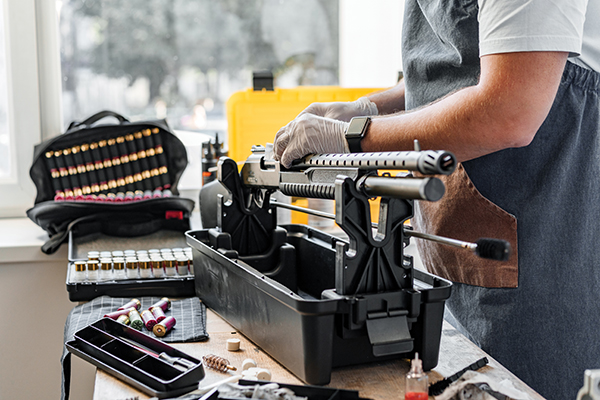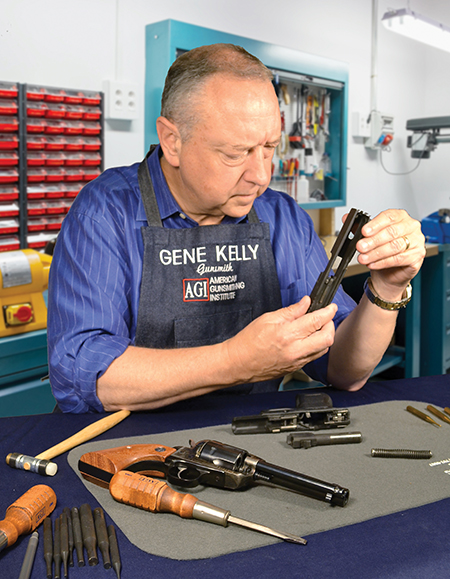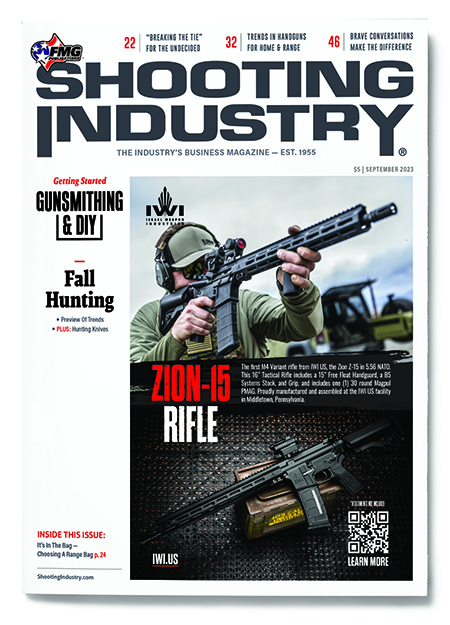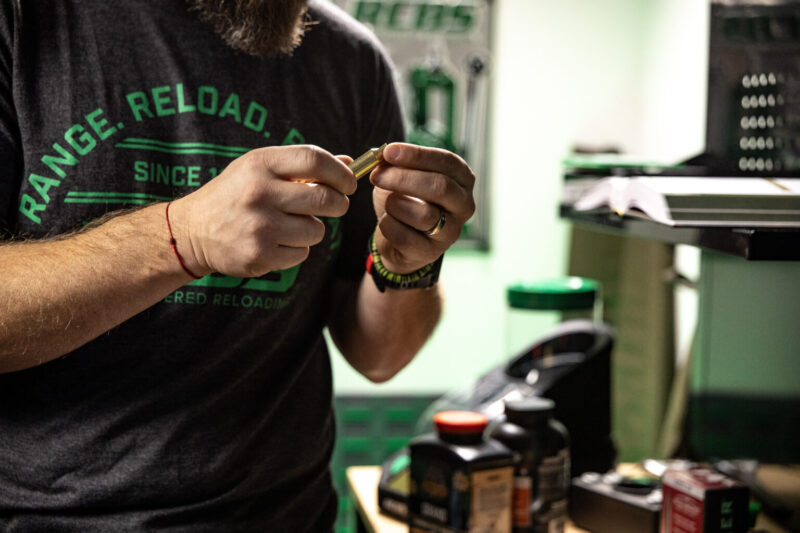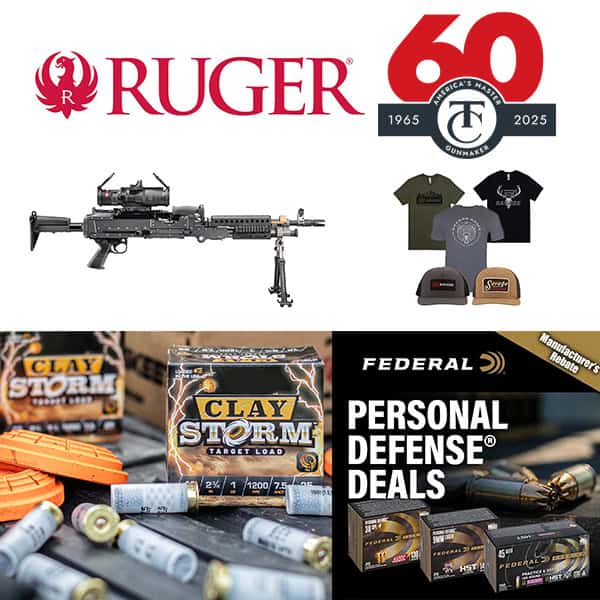Is There A Gunsmith In The House?
Employing a full-time gunsmith can reap dividends for a firearms retailer, but the decision requires careful consideration.
There are reasons for and against employing a full-time gunsmith, but the key determinants are whether it’s profitable and whether a gunsmith’s services generate an acceptable return on the investment of having this person on the payroll.
If a full-time staff gunsmith isn’t a good option, a retailer should have a close relationship with an independent gunsmith who provides prompt and reliable service. Gene Kelly, owner and founder of American Gunsmithing Institute in Napa, Calif., said offering gunsmith services — on-site or off — can be the difference between a vibrant business versus a stagnant one.
Two Visits Is Better Than One
Having studied his craft in a campus-based school, Kelly has worked as an in-house gunsmith, as an independent and as a third-party supplier to multiple dealers. He says now is a fine time to be a gunsmith because the demand for quality gunsmith services is very high.
“It is a great primary or secondary career,” Kelly said. “The days when gunsmiths didn’t make good money are over. What the market will bear is significant. It’s a great retirement career, and because there’s so much demand, there’s so much flexibility.”
Because there’s so much demand for gunsmiths, there’s also demand for retailers to connect customers to gunsmiths. According to Kelly, the availability of a gunsmith is often the factor that leads a customer to one store and away from a different store unable to readily accommodate his need.
“One reason a retailer should offer gunsmithing services — on-site or sending it out — is because a guy has to come into his gun shop twice,” Kelly explained. “Once to drop off the gun, and again to pick it up. Here are two opportunities to see all the new and used guns. To look at ammo and accessories.”
It’s also two opportunities to establish a relationship with the proprietor and staff, which can lead to future visits and future sales, and also to referrals.
“It’s an opportunity to talk to them about, ‘How do you use this gun? Who is using it? If it’s your wife’s gun, maybe you need some custom work to optimize it,’” Kelly suggested. “The bottom line is the customer needs to come in twice. It’s the same if services are in-house or out-of-house.”
“I can tell a customer something until I’m blue in the face, but when a gunsmith comes out and tells him the same thing, I mean, he’s got 35 years of experience. It’s hard to argue with that. A customer believes the gunsmith when he doesn’t believe me.”
Jim McQueen, Owner
On Target Guns & Gunsmithing • Kalamazoo, Mich
Provide What Others Don’t
Most gun shops have people who install scope bases, rings and scopes. They bore-sight scopes. Those people might be sales associates who merely know how to perform those tasks.
Actual gunsmith work is specialized. It requires special skills, special tools and special training to diagnose and remedy problems beyond the abilities of an untrained sales associate. A gunsmith will get a disabled gun running again. It might require making parts, doing some fine welding, brazing or soldering. Even something as seemingly simple as bedding an action or barrel requires time and skill.
“If someone is a part swapper, they’re guessing,” Kelly stated. “Other parts can be worn. They can be out of tolerance. To be a safe gunsmith, you have to understand design, function and then repair. This is what American Gunsmithing Institute is all about at the base level. Because you understand the systems — this type of lockup, this type of feed system, if it’s hammer-fire, striker-fire or whatever — you have to be able to understand breakdowns in systems and understand the repair.”
If your shop doesn’t provide the services a customer needs, he will find a shop that does. Especially if the repair is satisfactory and prompt, the second visit to pick up the customer’s gun will probably lead to a permanent relationship with the retailer and end a relationship with the unsatisfactory retailer.
“First Tier” Gunsmithing
Interestingly, many repairs begin with a simple cleaning, Kelly said. While performing a thorough cleaning, an experienced gunsmith often discovers problematic issues that haven’t surfaced yet. He might also discover the source of a customer’s complaint about their gun.
“The first level of service is doing cleanings,” Kelly informed. “Many cleanings will turn into repair jobs. Springs are out of tolerance. A spring is broken. An extractor is broken. The customer didn’t know, he just thought the gun was dirty. Sometimes he brings in a bag of parts after he tried to clean it himself and couldn’t get it back together.”
These interactions provide opportunities for a gunsmith to explain issues to the owner and discuss repair options. This establishes trust and confidence between the gun owner and the ’smith. It also deepens the trust between the owner and the retailer.
Diagnostics is an important component in “First Tier” gunsmithing, as Kelly calls it. For example, a customer might bring in a gun for cleaning, not knowing the gun has a non-functioning safety. An experienced gunsmith will notice the flaw and recommend its repair. A regular employee will clean the gun and return it to the owner without paying any attention to the safety.
“You send it out and the safety doesn’t work,” Kelly proposed. “Maybe it didn’t work when he brought it in, but who gets blamed?”
Customizing guns is another level of gunsmithing. This includes mounting scopes, sling swivels and bolt-on additions.
“You can do it fairly easily at the two level, but you still need to make it look right,” Kelly asserted. “You don’t want it to look amateurish. Then you get into altering parts, customizing or doing major restorations. Sometimes you would be better off jobbing it off to a gunsmith offsite if you don’t have one on staff.”
“One reason a retailer should offer gunsmithing services — on-site or sending it out — is because a guy has to come into his gun shop twice: once to drop off the gun, and again to pick it up. Here are two opportunities to see all the new and used guns. To look at ammo and accessories.”
Gene Kelly, Founder
American Gunsmithing Institute
Retailers Share Their Experiences
Wildman Arms in Bryant, Ark., has been in business since 2012. John Douglas, owner, said outsourcing repairs to a trusted gunsmith is a better option for him than having one on staff. However, he makes it clear to a customer the gunsmith is independent from Wildman. Any further communication about the matter is between the customer and the ’smith.
“What we found is parts can be difficult to acquire. A high level of skill is required, and the time requirement versus how much you can charge the customer for the time it takes to diagnose his problem, to find parts and make the repair, the value wasn’t beneficial to the customer, and it definitely was not on our behalf,” he reasoned.
Another problem is gunsmiths often have a backlog of work from multiple sources. Customers don’t like waiting to get their guns back.
“When we told people, yes we would work on their gun, they didn’t want to wait two or three weeks for the repair,” Douglas shared. “It made us look bad on the retail end. It made us lose business in addition to the loss of profit on their time. We were the bad guys even though we tried to do good.”
Jim McQueen, owner of On Target Guns & Gunsmithing in Kalamazoo, Mich., indicates a much different experience. He contends having a full-time gunsmith on staff is a tangible asset that enhances his business and reputation. Demand is so high he also employs a part-time gunsmith who has been with him for more than 10 years.
“I think it builds confidence with our customers,” McQueen posited. “A lot of people come in. They think they know a lot about guns. I can tell a customer something until I’m blue in the face, but when a gunsmith comes out and tells him the same thing, I mean, he’s got 35 years of experience. It’s hard to argue with that. A customer believes the gunsmith when he doesn’t believe me.”
What about the customer who isn’t quite ready for gunsmith services, but would like to try his hand at an entry-level modification or repair? The DIY market offers options for retailers to help this hobbyist get started.
Do-it-yourself gunsmithing workshops are increasingly popular, mostly in stores that sell a lot of modern sporting rifles and accessories. McQueen maintains that DIY workshops would not fill a gunsmith’s niche.
“We do sell some kits, punch kits, gunsmithing screwdrivers, that sort of thing,” McQueen confirmed. “We talk people through it when they come in, but I’m not sure it’s worth the time. We don’t have the capacity for it, but it might work in some shops.”
The takeaway is offering gunsmith services is a vital part of a firearm retailer’s reputation. A retailer’s business model and experience with his customers will determine how he will provide the service.

